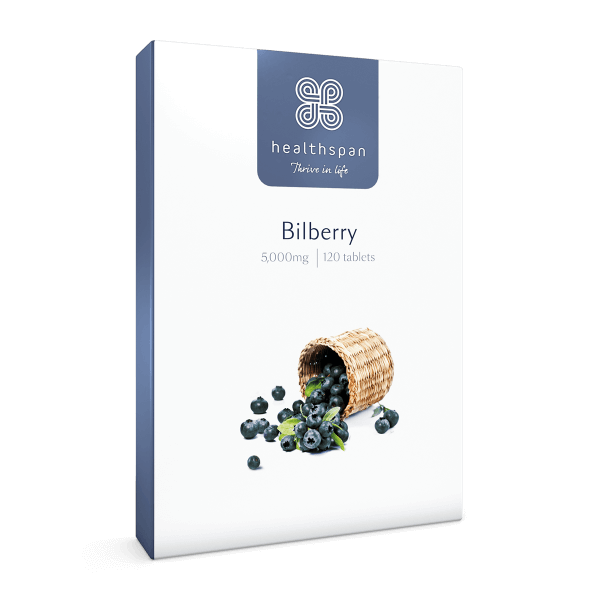The impressive qualities of bilberries mean they could benefit a variety of eye conditions, says nutritionist Sarah Dumont-Gale.
🕒 4 min read
It is estimated that 2 million people in the UK are currently living with sight loss, with age-related macular degeneration (AMD), glaucoma, cataracts and diabetic retinopathy reported as the most prevalent eye conditions to affect the population. The increasing use of digital devices, especially after the COVID-19 pandemic, is also contributing to an increase in eye symptoms such as dry eyes, eye fatigue and ocular pain.
Bilberries, the cousins of blueberries, have long been used for vision support and are praised for being beneficial for eye health, as well as reducing the effects of ocular conditions.
What are bilberries?
Bilberries are small berries that are very close relatives to other 'bark' berries such as blueberries, cranberries and huckleberries. They are harvested from deciduous shrubs that are native to the forest and mountainous regions in northern and central Europe, as well as some growing wild in North America.
Sometimes referred to as wild blueberries, or the English cousin of America's blueberry, from the outside these berries can be visually indistinguishable to the common person. However, the flesh inside bilberries is a lot darker and carries a more purple or crimson hue, which can be attributed to the higher concentrations of anthocyanins.
Why are bilberries so beneficial?
Due to their astringent qualities, bilberries have been used medicinally for thousands of years, primarily to treat diarrhoea, but they were also reported to aid scurvy, kidney stones, urinary tract infections and gout.
Many of their health benefits are due to the high concentration of anthocyanins, which are members of the flavonoid family that carry potent antioxidant qualities which can help protect the body against oxidative stress (an imbalance between free radicals and antioxidants), as well as curbing inflammation.
Bilberries are also an excellent source of vitamin C which helps to increase their antioxidant capacity.
How do bilberries support eye health?
The beneficial effects of bilberries are due to a number of different actions, including their ability to stabilise tear production, increase the strength of collagen fibres in the capillaries and ability to help build strong blood vessels, which improves circulation to the eye.
The potent anthocyanin content also works to support overall eye health and vision, and has been shown to be beneficial in supporting short-sightedness, as well as AMD.
The retina, where the macular is found, is particularly sensitive to oxidative stress due to its high oxygen consumption and increased light exposure. This is why bilberries, thanks to the anthocyanins' protective qualities against oxidative stress, can be so beneficial in AMD.
Further, the rich anthocyanins content has been shown to boost the production of rhodopsin, which is a light sensitive pigment that helps the eye adapt to light changes and improve night vision. Whilst the evidence is currently inconclusive to support this use, it is reported that during the Second World War, British pilots ate bilberry jam to improve their vision at night.

Bilberry
Supports and maintains eye health
- 50mg Bilberry extract
- Vitamin B2 for the maintenance of normal vision
- Natural source from fresh bilberries
Eye fatigue and dry eye
Office workers may benefit from bilberry supplementation as it has been shown to reduce eye fatigue, ocular pain, eye heaviness and uncomfortable sensations in the eye, all of which are associated with prolonged blue light exposure emitted from digital devices.
This has been further supported where adults who were exposed to visual display terminals (such as computer screens) for over 4 hours a day, noticed an improvement in eye fatigue and eye dryness when supplementing with bilberry for 6 weeks when compared with the placebo group.
Glaucoma
Glaucoma is a condition where the optic nerve in the eye is damaged and can cause gradual loss of sight over time. Bilberry may be supportive of glaucoma as shown in a two-year study where over 300 patients who had been diagnosed with normal tension glaucoma were recruited.
At the end of the two years, the patients who took an extract with 120mg of bilberry anthocyanins daily showed an improvement in visual function by around 30 per cent, where the placebo group experienced worsening visual function.
Diabetic retinopathy
Diabetic retinopathy is a common complication of diabetes mellitus, where the retina becomes damaged and haemorrhages can form. One study with 40 participants (35 had diabetic retinopathy) either took 160mg of bilberry extract twice daily for 1 month, or a placebo. There was a 79 per cent improvement in the retinal abnormalities in the bilberry extract group, whereas the placebo group remained unchanged.
Another small study including various types of retinopathy, including diabetic retinopathy and macular degeneration, showed similar improvements when supplemented with 600mg bilberry daily for 1 month.
Cataracts
The high flavonoid content in bilberries can work to protect the lens and retina from oxidative damage, and has been shown to be protective against protein build-up in the eye lens, as seen in cataracts.
A study including 50 patients with mild senile cataracts reported a 97 per cent success rate when supplementing with bilberry and vitamin E for 4 months.







